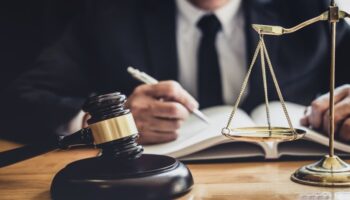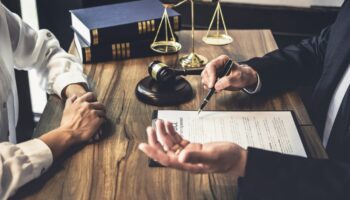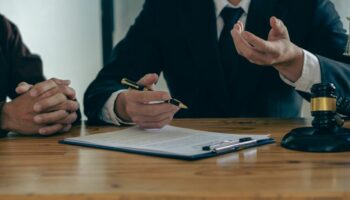What Happens If The At-Fault Party Doesn’t Have Car Insurance?
Being involved in a car accident can be stressful enough, but it becomes even more complicated if the at-fault driver doesn’t have insurance. This article will provide an overview of what happens when the responsible party for an accident lacks coverage.
We’ll discuss how to handle insurance claims, steps to take like contacting the police and a lawyer, and how to file an uninsured motorist claim. Even if you don’t have insurance yourself, there are options like filing a lawsuit against the uninsured driver. An experienced car accident attorney can deal with insurance companies on your behalf and make sure you receive fair compensation.
Understanding state laws around uninsured drivers and knowing what to do following an accident is key. While recovering damages from an uninsured motorist can be challenging, this article outlines the process so you can make informed decisions. With the right help and by taking the proper steps, you can seek compensation after a crash, even when the at-fault party doesn’t have insurance.
Understanding Fault and Insurance Claims
After a car accident, insurance companies will investigate to determine who was at fault. The at-fault driver is responsible for damages and injuries caused by the crash. The fault is assigned based on factors like traffic laws, right of way, and negligent driving behaviors.
If the at-fault driver has insurance, their provider will pay out claims to the not-at-fault party. This covers vehicle repairs, medical bills, lost wages, and other damages. The at-fault driver’s rates may also increase after causing an accident.
What if the At-Fault Driver Doesn’t Have Insurance?
Unfortunately, around 1 in 8 drivers in the U.S. are uninsured. If the at-fault driver doesn’t have insurance, the situation becomes more complicated. The not-at-fault driver will likely need to file a claim through their own policy. This is done through the uninsured motorist portion of a policy.
- Uninsured motorist coverage helps pay for injuries and vehicle damage when the at-fault driver has no insurance. There are generally two parts – one for bodily injury and one for property damage.
- Collision coverage can also help pay for vehicle repairs if you have that protection.
- The amounts paid out are generally the same as if the at-fault driver had insurance. Deductibles still apply.
What if I Don’t Have Insurance?
If neither driver has insurance, the options are more limited. Possible avenues include:
- File a personal injury lawsuit against the at-fault driver seeking compensation. This can be risky if they have limited assets.
- Make a claim with your own auto insurance if you have coverage like collision, uninsured motorist, or medical payments.
- Tap into any other insurance policies like health or disability insurance that may offer coverage.
- Claim bankruptcy if the financial situation is dire due to high medical bills and vehicle damage.
Will My Car Accident Attorney Deal with Insurance Companies on My Behalf?
Yes, an experienced car accident lawyer can handle communications and negotiations with insurers. They will deal with adjusters and claims processes so you can focus on recovery. An attorney can make sure you receive the maximum settlement.
Understanding the Process of Recovering Compensation After a Crash with an Uninsured Driver in the State
Being in an accident caused by a driver without insurance can leave you scrambling to cover vehicle repairs, medical bills, lost income, and other damages. While it adds challenges, you can take steps to recover losses after a collision with an uninsured motorist in the state.
Filing a Lawsuit Against the At-Fault Driver
One option is filing a personal injury lawsuit against the uninsured at-fault driver. A car accident attorney can help build a strong case by demonstrating:
- The other party’s negligence directly caused the crash and your damages.
- You suffered measurable losses like property damage, medical expenses, lost wages, etc.
- Your injuries and financial stress were a direct result of their actions.
- You were not negligent in any way.
Your attorney will handle the litigation process, including:
- Filing the lawsuit paperwork with the court.
- Serving the defendant’s legal documents.
- Gathering evidence like police reports, witness statements, and medical records.
- Negotiating with the defendant or their legal counsel.
- Taking the case to trial if a settlement cannot be reached.
The downside is the at-fault driver may not have sufficient assets to pay out a large claim. But a lawsuit is still worthwhile to hold them accountable.
Consult with an experienced personal injury lawyer to discuss the merits of your case. An attorney can advise if a lawsuit is likely to succeed and recover maximum compensation. They work on a contingency fee basis, so you pay nothing upfront.
What to Do Right After a Car Accident With an Uninsured Driver
Being in a collision is stressful enough. It becomes even more complicated if the at-fault motorist lacks insurance coverage. However, there are important steps to take immediately following an accident with an uninsured driver:
Call the Police to Report the Accident
Contact law enforcement to come to the scene. Be sure to file an official report documenting the crash. The police report will include key details like involved parties, vehicle damage, injuries, and determination of fault. This report can serve as crucial evidence if you pursue legal action or an insurance claim later.
Take Pictures
Use your smartphone to photograph damage to both vehicles, the accident scene, road conditions, and any injuries sustained. Visual evidence helps document what happened.
Exchange Information
Get the other driver’s name, contact details, driver’s license number, and vehicle registration. Also, provide them with your insurance and personal information.
Tell Your Car Insurance Company
Notify your insurer about the accident right away. Provide details about the collision, even if you don’t plan to file a claim yet. This establishes a record of the incident.
Call a Car Accident Lawyer
Consult an attorney experienced with uninsured motorist claims. They can advise you on the next steps to recover damages. Many lawyers offer free consultations and work on a contingency basis.
See a Doctor
Get medical attention even for minor injuries, as symptoms may develop later. Having a doctor document your injuries will help link them to the car accident. Follow all recommended treatment plans.
Taking these steps quickly after an accident with an uninsured driver positions you for the best outcome, whether that involves an insurance claim settlement or a personal injury lawsuit. Don’t delay!
Deadline for Filing Uninsured Motorist Claims in the State
If you are involved in an accident caused by an uninsured driver in the state, it’s important to understand the deadline for filing an uninsured motorist claim. This will allow you to take timely action and avoid losing your right to compensation.
- For property damage claims, you typically have 3 years from the date of the accident to file a claim with your insurer seeking reimbursement for vehicle repairs or other property losses.
- For personal injury claims, the statute of limitations also allows 3 years to file a claim or lawsuit related to your injuries and other damages like medical expenses and lost income.
- For hit-and-run accidents where the at-fault driver is unknown, you have 3 years from the date of the crash to file an uninsured motorist claim with your insurer.
- If the injuries from the accident are not immediately apparent, you may have 1 year from the time you discover them to file a claim.
- For minors injured by an uninsured driver, the 3-year countdown doesn’t start until they turn 18 years old.
- If the uninsured driver is found later, your insurer may subrogate to seek repayment from them.
The deadline can vary in certain situations. To make sure you do not miss the window to recover compensation, speak with an attorney promptly after an accident with an uninsured motorist. They can advise you on the claim filing timeline specific to your case. Don’t delay – contact a lawyer right away to protect your right to damages.
Frequently Asked Questions
Q: What happens if the at-fault party doesn’t have car insurance?
A: If the at-fault party doesn’t have car insurance, you may still be able to file a lawsuit for damages. However, the process can be more complex and it is recommended to seek the advice of a personal injury lawyer or car accident attorney.
Q: What is an at-fault party?
A: An at-fault party refers to the driver who is responsible for causing the accident. In a car accident, the at-fault party is the one who is deemed negligent or who violated traffic laws.
Q: What should I do if I get into an accident with an uninsured or underinsured driver?
A: If you get into an accident with an uninsured or underinsured driver, you should contact your insurance company and file a claim with your own insurance. This is where uninsured or underinsured motorist coverage comes into play. Your insurance company will pay for the damages if you have this type of coverage.
Q: Can I sue the at-fault party if they don’t have car insurance?
A: Yes, you may be able to file a lawsuit against the at-fault party, even if they don’t have car insurance. However, keep in mind that if the at-fault party doesn’t have insurance, they may not have the financial means to pay for the damages.
Q: What if I’m hit by an uninsured driver?
A: If you’re hit by an uninsured driver, your insurance company will typically cover the accident if you have uninsured motorist coverage. They will pay for your damages, medical expenses, and any other losses you may have incurred.
Q: What if the at-fault party’s insurance doesn’t cover the accident?
A: If the at-fault party’s insurance doesn’t cover the accident or if their insurance limits are not enough to fully compensate you, you may be able to file a lawsuit to seek additional compensation. Consult with a car accident lawyer to understand your legal options.
Q: What should I do if I’m in a car accident with an uninsured or underinsured driver?
A: If you’re in a car accident with an uninsured or underinsured driver, it’s important to gather as much information as possible. This includes the driver’s name, contact information, and license plate number. Additionally, contact your insurance company and provide them with all the details of the accident.
Q: Are there any insurance requirements for drivers?
A: Yes, most states require drivers to have liability insurance coverage. This insurance helps cover the damages to other vehicles or property if you’re at fault for an accident. It’s important to comply with your state’s insurance requirements to avoid penalties.
Q: What can I do if the at-fault driver doesn’t have car insurance?
A: If the at-fault driver doesn’t have car insurance, you may still be able to recover compensation for your damages through your own insurance policy. Check if you have uninsured or underinsured motorist coverage, as this can help cover the costs of your injuries and property damage.
Q: How can a personal injury lawyer help if the at-fault party doesn’t have car insurance?
A: A personal injury lawyer can help navigate the legal process if the at-fault party doesn’t have car insurance. They can advise you on your options, negotiate with the insurance company, and potentially file a lawsuit on your behalf to seek compensation for your injuries and losses.
Key Takeaways
- If the at-fault driver lacks insurance, file an uninsured motorist claim through your own policy to recover losses.
- Consider filing a personal injury lawsuit against the uninsured driver with help from an attorney.
- Even without insurance, options exist like using your medical pay, collision, or health insurance.
- Take steps like calling the police, documenting evidence, and contacting a lawyer immediately after an accident.
- An experienced car accident attorney can negotiate with insurers and pursue compensation.
- Understand your state’s laws and claim filing deadlines for uninsured motorist accidents.
- Drivers should maintain adequate insurance to protect themselves in case of a crash.
- At-fault drivers may be held personally liable for damages if they lack coverage.
- There are ways to recover losses after a collision with an uninsured driver, but legal help speeds up the process.






